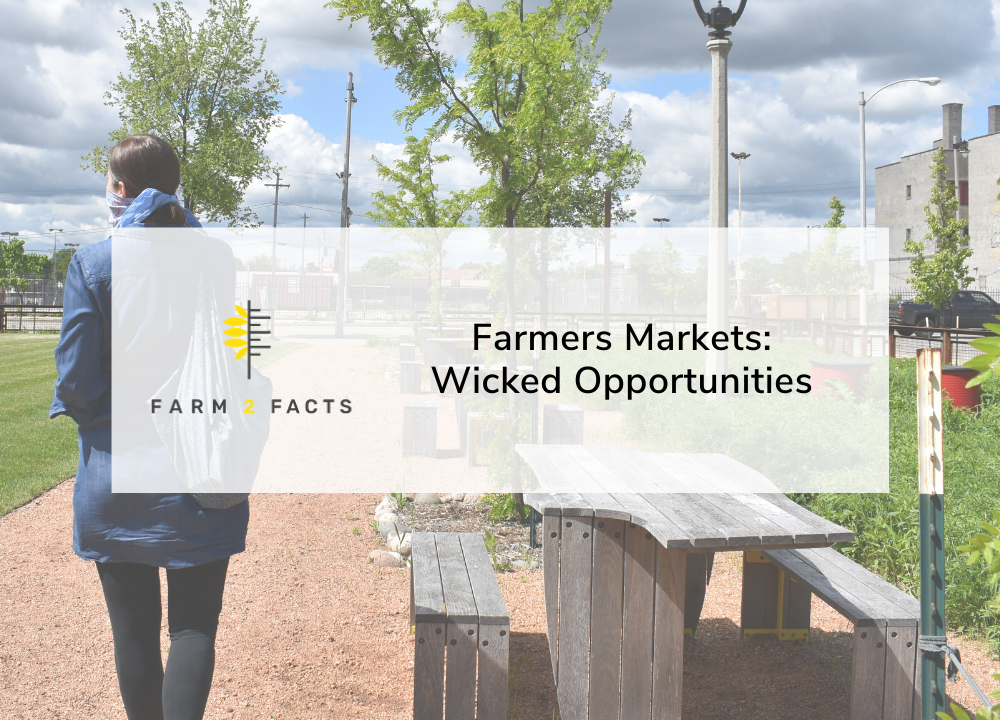
In our present-day scene, social, economic, and environmental problems are pressing, and because these wicked problems have no ending point, public health emergencies will continue to occur. However, there’s always a way forward, for instance, through embracing wicked opportunities- a reconstruction of problematic socio-organizational circumstances and context. One being farmers markets and similar outdoor, periodic marketplaces.
A century ago, markets were recognized and established by the government to help improve food access, unemployment, and immigration. More recently, the many benefits of markets have been characterized, and research has described the utility of markets for community development.
Markets are wicked opportunities, and a resource to rely on while responding to the threats of climate change and pandemics.
How is this the case? Consider this: Why is it when we read magazines and newspapers or browse media feeds we see photos of outdoor markets illustrating community? The reason is twofold. On the one hand, community is difficult to exemplify with its many facets. On the other hand, the photo evokes the image and represents the thousands of words it would take to convey the facts and processes involved in communities.
In today’s strange world, markets are considered essential services around the country, and managers are responding to community needs in many ways. Many markets have created “Drive-thru” and online marketplaces to help produce economic and food security; unfortunately, these practices sacrifice the educational, social, and political reasons people visit markets. These organizational models and technological tools are stop-gaps and cannot replace other facets of the familiar images of marketplaces in the media or our memories.
While these alternative sales practices will play a role post-COVID, waiting in line at familiar places leaves people wanting for the market interactions they miss. When needed, markets’ response to emergency situations are experimental, able to meet immediate needs and tests, overlap solutions to other problems, and of immediate local importance.
This is the case because of the few simple principles that farmers markets operate on:
- Connect locally produced crafts and foods with consumers
- Provide a place to practice community
- Convey information and opportunities people will discover and make their own
With these principles, managers don’t have to rethink their business model, reimagine their
organizational practices, or rebuild complex supply chains. In turn, they can communicate expectations to vendors and visitors who will help produce a market that minimizes risk and provides local products, practice in community building, and opportunities for learning. These principles have also made marketplaces hubs of vibrant communities for generations. They offer many contributions to society such as promotion of individual and public health through physical exercise and social life, conduits for information and healthy food, and learning opportunities for ecological and societal education for all involved in the community.
The COVID crisis clarifies how essential farmers markets have been for communities.
Marketplaces play a critical role in our increasingly vulnerable food system. Now is the time for state and local governments to ask managers how to strengthen farmers markets in this crucial moment and going forward. Without strong communication between market managers and the government in time of a crisis, there can be confusion instead of strong progress. For instance, after Wisconsin farmers markets were deemed essential services during the COVID pandemic, the Department of Agriculture Trade and Consumer Protection and the Department of Health Services initially produced very different lists of rules farmers markets had to follow. When this was brought to their attention and the state agencies reconciled their rules appropriate changes were made. However, this would have been avoided if the rules were made through a market manager/government partnerships.
Marketplaces, farmers markets in particular, promote health and wellness. Likewise, state-level government regulators foster the common good, but their pronouncements are not moments in a dialogue or information intended to release the creativity of market managers. Instead, when state-level regulators empower the local public health, then we can see the importance of context in replacing one-size-fits-all regulatory approaches with public/private relationships. These will optimize the mix of economic activity, learning, and social activities that are inclusive and safe.
Marketplaces, farmers, managers, vendors, and consumers create a wicked opportunity near you.
They observe and refine social, political, and economic modalities that express society. Marketplaces are wicked opportunities where we all should express our shared humanity.
